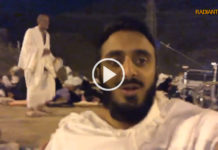All praise is due to Allah, Lord of all the worlds. Peace and blessings be upon the Messenger, his household and companions.
Fellow Muslims! Fear Allah from Whom nothing is hidden. Hidden things are to Him as clear as open things.
| He is with you (by His Knowledge) wherever you may be. And Allah is the All-Seer of what you do.
(Al-Hadeed 57:4) |
| And insult not those whom they (disbelievers) worship besides Allah, lest they insult Allah wrongfully without knowledge.
(Al-Anaam 6:108) |
| Do not interrupt his urination (i.e. let him finish). When he finished his urination, the Prophet asked for a tumbler of water and ordered that it be poured over the place of urine. (Al-Bukhari and Muslim) |
In the above hadeeth, the Messenger of Allah prevented his companions from doing what is permissible because of a more preponderant benefit which is prevention of the greater evil by opting for the lesser one and attainment of the greater benefit by abandoning the lesser one.
In another incidence, the Messenger of Allah refused Umars request he be allowed to kill Abdullaah ibn Ubayy, the leader of the hypocrites whose hypocrisy had then became manifest. He justified his refusal with his saying, I do not want people to say that Muhammad is killing his companions.
he also refused to rebuilt the Kabah upon the pillars of Ibraaheem and told Aaishah,
| If your people had not been recent converts to Islaam, I would have spent the treasure of the Ka’bah in the way of Allah and would have constructed its door just on the level of the ground and would have encompassed in it the space of Hijr. (Muslim) |
The fasting Muslim is prohibited from hugging his wife if he fears that doing so could lead to vitiation of his fast. At-Tirmidhee said, Some scholars are of the view that the fasting Muslim can kiss his wife if he is able to control himself.
Likewise, Islaam ordains that a Muslim can only has bodily contact with his menstruating wife when her private parts are covered because if a fear that if those parts are not covered, contacting her may lead to doing what is forbidden. All this is done on the principle of blocking means that lead to forbidden things and considering the end results of actions.
One of the proofs of this principle is Allahs command,
| And let them not stamp their feet so as to reveal what they hide of their adornment.
(An-Nor 24:31) |
| Do not perpetrate what the Jews perpetrated by using subterfuge means to turn what Allah forbade into lawful things. (Ibn Battah) |
Dear Muslims! If the law of Islaam forbids some permissible things that can lead to forbidden things, what then would one say about those who take the path of misinterpretation to repudiate the texts of the Quraan and the Sunnah, seek to cast doubt on their meanings through false arguments and tricky means in order to make forbidden thing lawful and encourage the masses to disobey Allah and weaken the Ummahs sense of adherence to the religion of Allah.
Dear brethren! The greatest calamity is what afflicted the majority of the Muslims where they audaciously talk about the lawful and unlawful with their mere opinions thereby turning issues of Islaamic jurisprudence into a grazing ground for every Tom, Dick and Harry and deciding that the view of the majority on these issues is the most correct. This is tantamount to telling lies against Allah, committing offense against the scholars and being insolent with the Ummah. This is a burning evil, a great calamity and a path of destruction.
Al-Qaasim said,
| By Allah, to have my tongue cut off is dearer to me than to talk on what I know nothing about. |
Imaam Maalik said,
| The Companions of the Prophet used to be greatly inconvenienced by issues of Islaamic jurisprudence, and none of them would answer a question until he had got the opinion of his companions. This is in spite of their appropriateness, success and purity. |
What would one then say about our generation whose hearts are filled with sins?
Dear Muslims! In this age, there are many tricksters in the garb of reformers, many hypocrites in the garb of sincere advisers and charlatans in the garb of the zealous followers. These swindlers use sweet words to lure the simpletons and the ignorant into their snares and they argue with falsehood against the manifest truth. It is incumbent upon the Muslims to be careful of the people of malicious intentions and misleading desires who use falsehood and deception.
If there is a matter of ambiguity, the Muslims should consult the erudite scholars and Muftis. For, going back to them is the path of security against falling into the trap of mischief-makers and charlatans.
It is the scholars who have better knowledge of comparison between things. It is they who have clearer understanding of ambiguous things. Turning away from their judgment is a recipe for destruction, and adhering to their teachings is the way to success. Abdullaah ibn Masood said,
| The people shall remain in righteousness and harmony as long as they take their knowledge from Muhammads Companions and from their own elders. But if they take their knowledge from their young and inexperienced ones they are bound to perish. |
May Allah protect us from causes of perdition, protect us and make us steadfast upon His religion us until death.
Fellow Muslims! Fear Allah and be dutiful to Him. Allah says,
| O you who believe! Be afraid of Allah, and be with those who are true (in words and deeds).
(At-Tawbah 9:119) |
| The righteous were so pious that they even abandon many things that are lawful out of fear of forbidden things. |
The Messenger of Allah said,
| Both legal and illegal things are evident but in between them there are doubtful (suspicious) things and most of the people have no knowledge about them. So whoever saves himself from these suspicious things saves his religion and his honour. And whoever indulges in these suspicious things is like a shepherd who grazes (his animals) near the Hima (private pasture) of someone else and at any moment he is liable to get in it. (O people!) Beware! Every king has a Hima and the Hima of Allah on the earth is His illegal (forbidden) things. (Al-Bukhari and Muslim) |
And whoever embarks upon that which is ambiguous might eventually fall into what is sinful. The wise is not the one who only knows what is good and what is evil but the one who can identify the better of the two good things and the worse of the two evils.
A poet was right when he said:
| The wise is the one who when afflicted with two diseases, he seeks the cure of the more dangerous first. |

SUBSCRIBE AND LEARN...
- Fresh articles
- Increase your Islamic knowledge
- Build a Powerful Connection with Allah




















